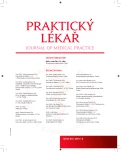-
Medical journals
- Career
Idiopathic orbital pseudotumour
Authors: A. Meleková 1; E. Ehler 1; H. Adámková 2; L. Ungermann 3
Authors‘ workplace: Pardubická krajská nemocnice a. s. Neurologická klinika Přednosta: doc. MUDr. Edvard Ehler, CSc. 1; Oční oddělení Přednosta: doc. MUDr. Jan Novák, CSc. 2; Radiodiagnostické oddělení Přednosta: MUDr. Leoš Ungermann, Ph. D. 3
Published in: Prakt. Lék. 2014; 94(6): 279-281
Category: Case Report
Overview
Rapidly progressive movement disorder of the eye bulb associated with pain is a rare clinical presentation, which requires prompt diagnostics and therapy. Painful ophtalmoplegia appears in case of the lesion of cavernous sinus, extraocular muscles or retrobulbar tissue, but could be caused also by the damage of the brainstem. Although modern imaging modalities such as CT, MRI and neurophysiological examination are available, the diagnostic process is not simple. Moreover the prognosis is not often favourable. Both patients admitted at our department, suffering from painful ophtalmoplegia, required complicated diagnostic process, but had favourable outcome, which was a proposal for our publication.
Keywords:
orbital pseudotumour – ptosis – painful ophtalmoplegia – eye movement disorder
Sources
1. Bernardino CR, Davidson RS. Angle-closure glaucoma in association with orbital pseudotumor. Ophthalmology 2001; 108 : 1603–1606.
2. Carvounis PE, Mehta AP. Orbital myositis associated with borrelia burgdorferi infection. Ophthalmology 2004; 111 : 1023–1028.
3. Demirci H, Shields CL. Orbital pseudotumors in the older adult population. Ophthalmology 2002; 109 : 243–248.
4. Gordon LK. Orbital infammatory disease: A diagnostic and therapeutic challange. Eye 2006; 20 : 1196–1206.
5. Chaudhry IA, Shamsi FA. Orbital pseudotumor: distinct diagnostic features and management. Middle East Ar J Ophthalmol 2008; 15 : 17–27.
6. Jacobs D, Galetta S. Diagnosis and management of pseudotumor. Curr Opin Ophthalmol 2002; 13 : 347–335.
7. Kanski JJ. Clinical ophthalmology. Fourth edition. Oxford: Butterworth-Heinemann 2002; 566–569.
8. Kapur R, Sepahdari AR. MR imaging of orbital inflammatory syndrome, orbital cellulitis, and orbital lymphoid lesions: the role of diffuse-weighted imaging. AJNR 2009; 30 : 64–70.
9. Klímová A, Diblík P. Zánětlivý pseudotumor očnice. Neurol. praxi 2011; 12(3): 164–166.
10. Liu GT, Volpe N. Neuro-ophthalmology, diagnosis and management. Philadelphia: W. B. Saunders Co 2001 : 672–688.
11. Lutt JR, Lim LL. Orbital inflammatory disease. Semin Arthritis Rheum 2008; 37 : 207–222.
12. Mahr MA, Salomao DR. Inflammatory orbital pseudotumor with extension beyond the orbit. Am J Ophthalmol 2004; 138(3): 396–400.
13. Rubin PA, Foster CS. Etiology and management of idiopathic orbital inflammation. Am J Ophthalmol 2004; 138 : 1041–1043.
14. Song A, Yen MT. Do not overlook possible orbital inflammatory pseudotumor. Ophthalmology Times 2002; 3 : 30–31.
15. Yeun SJ, Rubin PA. Idiopathic orbital inflammation : ocular mechanisms and clinicopathhology. Ophthalmol Clin North Am 2002; 15 : 121–126.
Labels
General practitioner for children and adolescents General practitioner for adults
Article was published inGeneral Practitioner

2014 Issue 6-
All articles in this issue
- Idiopathic orbital pseudotumour
- Myocardial infarction as the first symptom of essential thrombocythemia in a young man
- Dysphagia associated with neurological disorders
-
Vaccination and its role in prevention of infectious diseases.
A vaccination refusal – a serious problem of public health - Occupational diseases reported in the Czech Republic in 2013
- Patient’s safety at operating theatre in Czech and Swedish hospitals
- Introduction to medical ethics – how to understand Hippocratic tradition today
- General Practitioner
- Journal archive
- Current issue
- Online only
- About the journal
Most read in this issue- Dysphagia associated with neurological disorders
- Idiopathic orbital pseudotumour
- Patient’s safety at operating theatre in Czech and Swedish hospitals
-
Vaccination and its role in prevention of infectious diseases.
A vaccination refusal – a serious problem of public health
Login#ADS_BOTTOM_SCRIPTS#Forgotten passwordEnter the email address that you registered with. We will send you instructions on how to set a new password.
- Career

